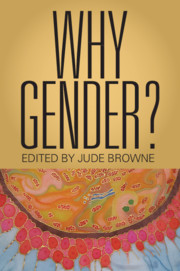Book contents
- Why Gender?
- Why Gender?
- Copyright page
- Dedication
- Contents
- Figures
- Tables
- Contributors
- A Prefatory Note
- Acknowledgements
- Introduction
- Chapter 1 Gender in Translation: Beyond Monolingualism
- Chapter 2 Gender and the Queer/Trans* Undercommons
- Chapter 3 Gender and the End of Biological Determinism
- Chapter 4 Gender, Sexuality, Race, and Colonialism
- Chapter 5 Posthuman Feminism and Gender Methodology
- Chapter 6 Gender, Sperm Troubles, and Assisted Reproductive Technologies
- Chapter 7 Gender, Capital, and Care
- Chapter 8 Aspiration Management: Gender, Race, Class, and the Child as Waste
- Chapter 9 Gender, Race and American National Identity: The First Black First Family
- Chapter 10 Gender and the Collective
- Chapter 11 Willfulness, Feminism, and the Gendering of Will
- Chapter 12 Gender and Emigré Political Thought: Hannah Arendt and Judith Shklar
- Chapter 13 Feminism and the Abomination of Violence: Gender Thought and Unthought
- Chapter 14 Trafficking, Prostitution, and Inequality: The Centrality of Gender
- Chapter 15 Gender, Revenge, Mutation, and War
- Chapter 16 Bed Peace and Gender Abnorms
- Index
- References
Chapter 5 - Posthuman Feminism and Gender Methodology
Published online by Cambridge University Press: 15 October 2021
- Why Gender?
- Why Gender?
- Copyright page
- Dedication
- Contents
- Figures
- Tables
- Contributors
- A Prefatory Note
- Acknowledgements
- Introduction
- Chapter 1 Gender in Translation: Beyond Monolingualism
- Chapter 2 Gender and the Queer/Trans* Undercommons
- Chapter 3 Gender and the End of Biological Determinism
- Chapter 4 Gender, Sexuality, Race, and Colonialism
- Chapter 5 Posthuman Feminism and Gender Methodology
- Chapter 6 Gender, Sperm Troubles, and Assisted Reproductive Technologies
- Chapter 7 Gender, Capital, and Care
- Chapter 8 Aspiration Management: Gender, Race, Class, and the Child as Waste
- Chapter 9 Gender, Race and American National Identity: The First Black First Family
- Chapter 10 Gender and the Collective
- Chapter 11 Willfulness, Feminism, and the Gendering of Will
- Chapter 12 Gender and Emigré Political Thought: Hannah Arendt and Judith Shklar
- Chapter 13 Feminism and the Abomination of Violence: Gender Thought and Unthought
- Chapter 14 Trafficking, Prostitution, and Inequality: The Centrality of Gender
- Chapter 15 Gender, Revenge, Mutation, and War
- Chapter 16 Bed Peace and Gender Abnorms
- Index
- References
Summary
Gender is a meta-methodological tool, a navigational instrument – gender is as gender does. In this chapter I apply gender as methodology to provide a cartography of the intersections between feminism and the posthuman predicament by arguing that feminism is not only a humanism; it needs to overcome anthropocentrism and embrace non-human life and entities.
- Type
- Chapter
- Information
- Why Gender? , pp. 101 - 125Publisher: Cambridge University PressPrint publication year: 2021
References
- 2
- Cited by



